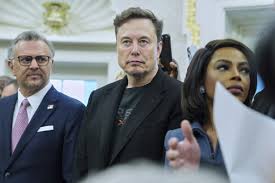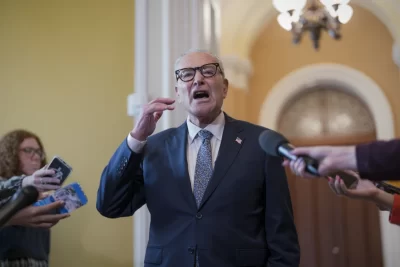
WASHINGTON — Elon Musk is leaving his government role as a top adviser to President Donald Trump after spearheading efforts to reduce and overhaul the federal bureaucracy.
His departure, announced Wednesday evening, marks the end of a turbulent chapter that included thousands of layoffs, the evisceration of government agencies and reams of litigation. Despite the upheaval, the billionaire entrepreneur struggled in the unfamiliar environment of Washington, and he accomplished far less than he hoped.
He dramatically reduced his target for cutting spending — from $2 trillion to $1 trillion to $150 billion — and increasingly expressed frustration about resistance to his goals. Sometimes he clashed with other top members of Trump’s administration, who chafed at the newcomer’s efforts to reshape their departments, and he faced fierce political blowback for his efforts.
Musk’s role working for Trump was always intended to be temporary, and he had recently signaled that he would be shifting his attention back to running his businesses, such as the electric automaker Tesla and the rocket company SpaceX.
But administration officials were often vague about when Musk would step back from his position spearheading the Department of Government Efficiency, known as DOGE, and he abruptly revealed that he was leaving in a post on X, his social media website.
“As my scheduled time as a Special Government Employee comes to an end, I would like to thank President @realDonaldTrump for the opportunity to reduce wasteful spending,” he wrote. “The @DOGE mission will only strengthen over time as it becomes a way of life throughout the government.”
A White House official, who requested anonymity to talk about the change, confirmed Musk’s departure.
Musk announced his decision one day after CBS released part of an interview in which he criticized the centerpiece of Trump’s legislative agenda by saying he was “disappointed” by what the president calls his “big beautiful bill.”
The legislation includes a mix of tax cuts and enhanced immigration enforcement. Musk described it as a “massive spending bill” that increases the federal deficit and “undermines the work” of his Department of Government Efficiency, known as DOGE.
“I think a bill can be big or it could be beautiful,” Musk said. “But I don’t know if it could be both.”
Trump, speaking in the Oval Office on Wednesday, defended his agenda by talking about the delicate politics involved with negotiating the legislation.
“I’m not happy about certain aspects of it, but I’m thrilled by other aspects of it,” he said.
Trump also suggested that more changes could be made.
“We’re going to see what happens,” he said. “It’s got a way to go.”
AP Washington correspondent Sagar Meghani reports on Elon Musk criticizing President Trump’s legislative centerpiece.
Republicans recently pushed the measure through the House and are debating it in the Senate.
Musk’s concerns are shared by some Republican lawmakers. “I sympathize with Elon being discouraged,” said Wisconsin Sen. Ron Johnson.
Speaking at a Milwaukee Press Club event on Wednesday, Johnson added that he was “pretty confident” there was enough opposition “to slow this process down until the president, our leadership, gets serious” about reducing spending. He said there was no amount of pressure Trump could put on him to change his position.






